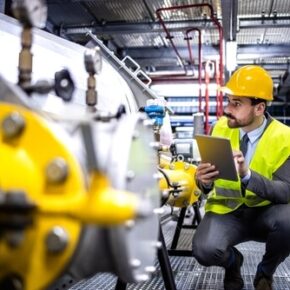
Posted on: 07. 18. 23
Gas conditioning plays a critical role in the energy industry. As we all know, natural gas isn’t consumer-ready and must undergo a series of processes to remove impurities and ensure it meets the required quality standards.
Gas conditioning is essential for enhancing efficiency and safety for consumers. However, the process also comes with inherent risks if not managed properly.
To safeguard the environment, workers, and the public, stringent safety regulations and best practices must be a priority at your facility.
Let’s go beyond the importance of gas conditioning and explore the importance of safety and compliance in the process, along with the latest best practices to ensure a secure and sustainable operation.
The Importance of Safety in Gas Conditioning
Safety should be the foremost consideration in gas conditioning processes due to the nature of the substances involved.
Natural gas often contains impurities, including hydrogen sulfide, carbon dioxide, and water vapor, which can be hazardous if not properly managed.
Gas conditioning facilities deal with high pressures, extreme temperatures, and potentially toxic chemicals, making safety protocols a crucial aspect of their operations. Let’s dig into some of the biggest safety measures facility managers can take to keep their employees safe.
Implementing Comprehensive Risk Assessments
Before commencing any gas conditioning project, a comprehensive risk assessment must be conducted to identify potential hazards and their corresponding mitigation measures.
Facility managers should work closely with experienced engineers and safety experts to assess and address risks effectively.
The risk assessment process helps facilities and equipment operators identify potential risks and hazards. As these practices keep safety in mind, they prevent accidents and ensure personnel start the process with the best foot forward.
Regular Inspections and Maintenance
Periodic inspections and maintenance are essential to identify and address equipment wear and tear, potential leaks, and other safety concerns. We suggest inspecting gas coolers and other production equipment every six months.
These pieces of equipment are put through heavy use, and implementing preventive maintenance measures can significantly reduce the likelihood of equipment failure and subsequent safety incidents.
Ensuring Compliance with Regulatory Standards
Compliance with regulatory standards is non-negotiable when it comes to gas conditioning. Governments and international bodies have established strict guidelines and regulations to ensure raw natural resources are safely transformed into consumer products used around the world.
Gas production companies must adhere to these standards to prevent accidents, protect the environment, and maintain the integrity of the gas supply chain.
Understanding Local and International Regulations
Gas conditioning facilities are subject to a wide range of regulations at the local, national, and international levels. Compliance requirements may vary depending on the location, size, and type of gas conditioning operation. Staying informed with the Texas Administrative Code about the latest updates and amendments to relevant regulations is crucial to maintain compliance and ensuring all-around safety.
Thorough Safety Training
It’s no secret that drill sites and natural gas production facilities are physically risky locales for employment. Injuries are common in the oil and gas industry. Unfortunately, when these accidents occur, they can come with a deadly aftermath.
As with any industry, our goal is to ensure our employees operate equipment safely and can live out a comfortable, confident tenure at the facilities they work with.
Safety training resources are now readily available to those in oil and gas, so you and your team can always remain on top of the latest equipment safety measures and requirements.
Perfect Your Gas Conditioning Process With Pro-Gas Services, LLC
Ensuring safety and compliance in gas conditioning is a paramount responsibility for natural gas production facilities. By implementing comprehensive risk assessments, regular inspections, and maintenance, operators can minimize potential hazards and protect workers and the environment.
Keep in mind, however, that excellent safety practices start with excellent equipment. At Pro-Gas Services, LLC, our gas conditioning equipment and other leading products and services help keep the facilities we serve functioning safely and efficiently.


